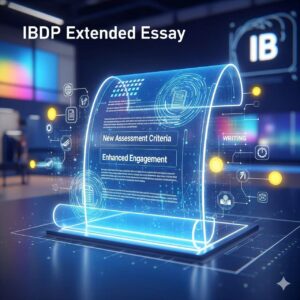The Extended Essay (EE) has always been a cornerstone of the IB Diploma Programme, a challenging yet rewarding journey into independent research. But like all things in education, it evolves! The IB has rolled out some significant updates to the EE syllabus and assessment, designed to enhance your learning experience and clarify expectations.
Let’s dive into what’s new and how you can ace your EE under the revised framework!
Why the Change? A Focus on Your Learning Journey
The updates to the EE are all about putting your learning process front and center. The IB aims to make the EE more accessible, transparent, and focused on the skills you develop along the way, rather than just the final product. The core remains the same: a deep dive into a subject you’re passionate about, culminating in a 4,000-word research paper. The way it’s assessed, however, now better reflects the true effort and critical thinking involved. 
Key Changes to the Assessment Criteria (First Assessment 2026)
The previous A-E grading system is out, replaced by a more nuanced assessment rubric with a maximum of 34 points. This new structure breaks down your EE into clearer components, giving you more targeted feedback.
Here’s a snapshot of the revised criteria:
- Criterion A: Focus and Method (6 points)
- This criterion now consolidates what was previously “Topic,” “Research Question,” and parts of “Methodology.” It’s all about how well you define your research, justify your approach, and select appropriate sources. A strong start here sets the stage for success!
- Criterion B: Knowledge and Understanding (6 points)
- This assesses how effectively you demonstrate your understanding of the subject area. It’s about more than just summarizing information; it’s about applying concepts and theories relevant to your chosen discipline.
- Criterion C: Critical Thinking (12 points)
- This is where your analytical prowess shines! This expanded criterion truly tests your ability to evaluate sources, develop arguments, consider counter-arguments, and make reasoned judgments. It’s the highest-weighted criterion, emphasizing the IB’s focus on deep intellectual engagement.
- Criterion D: Presentation (4 points)
- Fairly straightforward, this criterion focuses on the structural and formal elements of your essay: organization, clarity, referencing, and academic language. A well-presented essay makes your arguments easier to follow.
- Criterion E: Engagement (6 points)
- This is a significant and exciting change! Previously, “Reflection” was a separate criterion. Now, “Engagement” covers not only your reflections but also your interaction with your supervisor. Your Reflections on Planning and Progress Form (RPPF) is crucial here, documenting your decision-making, challenges, and learning throughout the EE process. This criterion truly values your journey and intellectual growth.

- This is a significant and exciting change! Previously, “Reflection” was a separate criterion. Now, “Engagement” covers not only your reflections but also your interaction with your supervisor. Your Reflections on Planning and Progress Form (RPPF) is crucial here, documenting your decision-making, challenges, and learning throughout the EE process. This criterion truly values your journey and intellectual growth.
What These Changes Mean for YOU
- Greater Clarity: The new criteria are more prescriptive, making it clearer what examiners are looking for.
- Emphasis on Process: The beefed-up “Engagement” criterion highlights the importance of consistent effort and thoughtful reflection, not just the final product. Your RPPF is no longer just an administrative task but a key part of your assessment.
- Critical Thinking is King: With 12 points, Criterion C underscores the need for genuine analysis and evaluation in your research. No more surface-level summaries!
- Supervisor Interaction is Vital: Your meetings and discussions with your supervisor are now explicitly valued in the “Engagement” criterion. Make the most of them!
How CoreTone Tutors Can Help You Excel
Navigating these new changes can feel daunting, but that’s where CoreTone Tutors steps in. Our expert tutors are fully updated on the revised EE syllabus and assessment criteria. We can help you:
- Deconstruct the Criteria: Understand exactly what each point in the new rubric demands.
- Craft a Strong Research Question: Ensure your focus is sharp and viable for the “Focus and Method” criterion.
- Develop Deep Critical Thinking: Hone your analytical and evaluative skills for Criterion C.
- Maximize Your Engagement: Guide you on effectively using your RPPF to showcase your learning journey and supervisor interactions.
- Structure for Success: Ensure your presentation is flawless and your arguments flow logically.

The Extended Essay remains an incredible opportunity for you to explore a topic you’re passionate about. With the right guidance and understanding of the new assessment, you’re well-equipped to make your EE a standout piece of academic work.
Ready to master your EE under the new syllabus? Get in touch with CoreTone Tutors today!
